Interview with Jane Calovski: The independent cultural sector is tired of empty promises
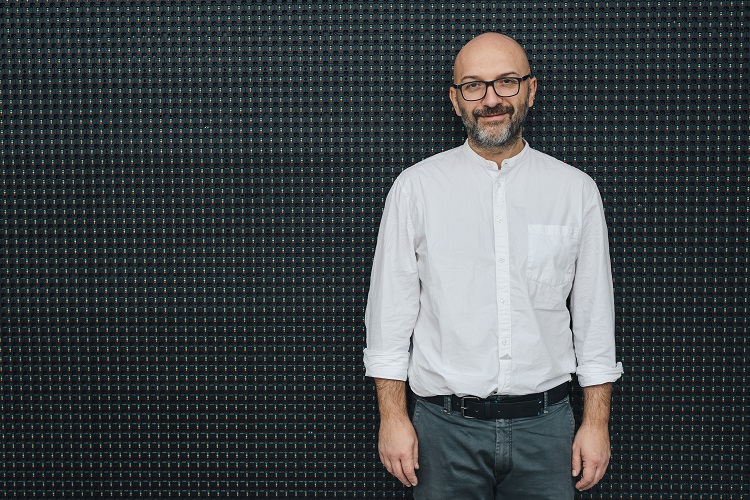
With an international career that has lasted for 20 years, Jane Calovski has a huge and diverse experience as an artist, mentor and lecturer, and his name is associated with the project space "Press to Exit", the association "Galikul" and the association "Jadro".
A wide range of topics was opened in the conversation with the visual artist Jane Calovski. The initial reason for the meeting was the activities of the Association for Culture, Literature and Art "Galikul", which includes the whole Calovski family. The activities of "Jadro" - the Association of the Independent Cultural Scene, where Calovski is one of the founders, emerged as a bigger topic. In the end, we opened the question about the author's engagements, visual projects and presentation of our own artistic activity.
Last week, "Galikul" promoted the book by Dolores Atanasova - Lori, winner of the "Todor Calovski" award, which "Galikul" has been awarding since 2016. For what purpose did you establish the award five years ago?
- We established the award in the fall of 2015 together with my mother Biljana, my sister Dance and I, on behalf of our father, one of the most prominent contemporary Macedonian writers Todor Calovski (1945-2015), who dedicated his life to poetry and Macedonian literature. The award is specifically given in the fields of poetry, literary criticism, essays and creative prose forms. In those moments we wanted to turn the pain of his sudden departure into something positive and appropriate to the way our father lived and celebrated poetry and literature every day, hanging out with friends and loving his native Galichnik.
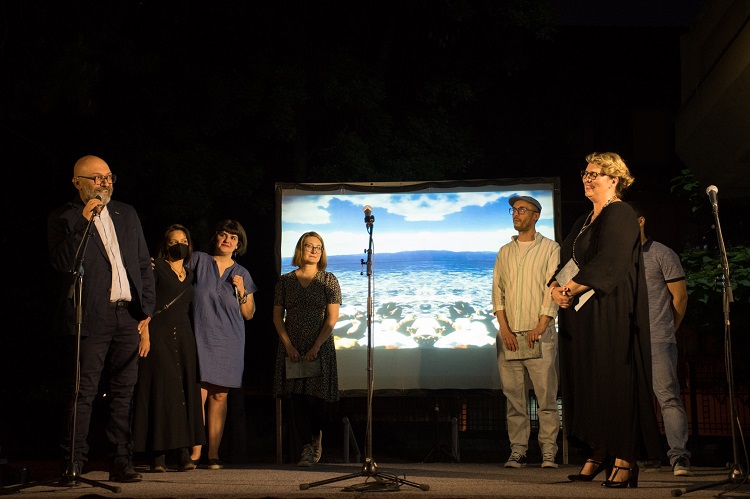
Inheritance from your father Todor Calovski left you the Galichnik literary colony. What are the plans for her further existence?
- He established the Galichnik Literary Colony in 1992, with the independence of Macedonia, in a desire to rediscover Galichnik as an inspiring space where writers will socialize, share and create new poetry. With incredible dedication and support from our mother Biljana, he built this idea together with his friends and colleagues Gane Todorovski, Mateja Matevski, Bogomil Gjuzel, Ilhami Emin, Luan Starova, Radovan Pavlovski, Atanas Vangelov, Liljana Dirjan, Gordavna Mirhakovska Radichevski, Venko Andonovski, Vesna Mojsova пиepiвскаevska, Vladimir Martinovski, and the younger generation and award winners Dolores Atanasova-Lori, Biljana Stojanovska, Ivan Antonovski, Marta Markoska, and many other our most important writers of all generations. There is a lot to talk and tell about the event, which will be 30 years old since its appearance in the Macedonian cultural space. I have to be honest that in today's conditions holding such an important event is a complex production that requires time and resources, and certainly not easy without Chalo and his incredible energy, program vision and complete commitment. For the last five years, my family and friends have been trying to maintain it with a lot of love, understanding and cooperation from so many wonderful people, authors, friends and followers of our father's work, for which we are infinitely grateful. This year we are already planning the program to properly celebrate this important jubilee - 30 years since the first holding of the Galichnik Literary Colony.
Both the award and the colony are important events on the Macedonian cultural map, but in addition to their maintenance, you were involved in founding the largest network of cultural organizations, informal groups and individuals in our country, the network "Core" - Association of Independent Cultural Scene. Almost ten years after its founding, does the network manage to meet the challenges of our time?
- "Jadro" is an organization that not only manages to withstand all possible political and financial challenges, but with the joint commitment of its members and allies in the region, manages to maintain and become stronger in its core mission - continuous advocacy for , and the development of the, independent - non-institutional cultural scene. Of course, it is not at all easy and simple to maintain and preserve everything that has been created since its inception in 2012 until now. But, you know, "Jadro" is a kind of phenomenon in our country, because it managed to unite a large number of organizations, individuals and informal groups from all over Macedonia based on the principles of unity, solidarity and mutual cooperation, transparency in advocating the common good, not the particular , promotion of financially sustainable civic-public forms of partnership with the community, as opposed to private-public forms of clientelistic interests. These principled and ideological postulates are extremely important in creating social dialogue and advocating for progressive socio-cultural values and cultural policies.
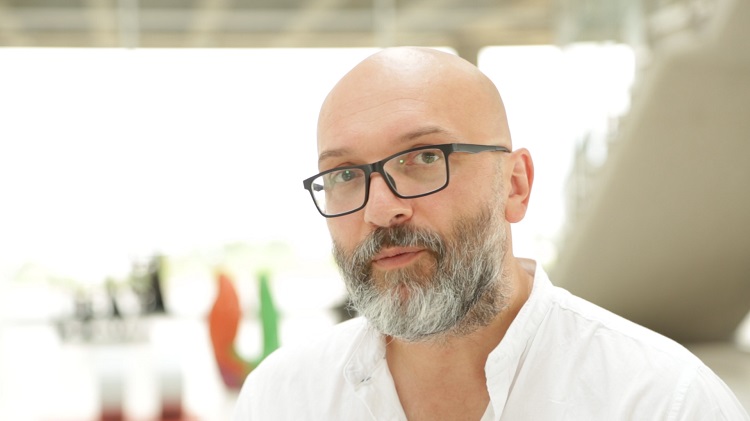
On behalf of the association "Jadro" you recently had a public reaction and request for a meeting with the Minister of Culture Irena Stefoska, dissatisfied with the situation on the cultural scene in our country. What was the reason for the reaction?
- As you know, the public reaction was comprehensive in terms of remarks. Although we have been facing many challenges for years, including: insufficient capacity of the sector, politicization and partisanship of decision-making processes, inadequate bureaucratization, workers' rights and profiling of independent cultural workers as independent actors, problems related to insufficient visibility, capacity and recognition the work of organizations outside the capital, the non-comprehensive measures regarding the pandemic, the insufficient engagement in analyzing the needs, working conditions, as well as the standard of living and survival of cultural workers and an appropriate systemic and financially sustainable response to them. All this is extremely important and requires opening a dialogue so that we can hear each other, offer ideas and find solutions.
Did the requested meeting take place?
- The requested meeting with the Minister of Culture was realized, and thus opened space for a series of consecutive consultative meetings with various sectors, in order to address the problems that hinder the implementation of good practices, such as: unnecessary additional bureaucratization and difficulty in project implementation, misunderstanding of the role of interdisciplinary activity, which is specifically established to serve complex intersectoral projects with capacitive affinities, irregular payment of funds for completed projects, nor timely start of contract processes in the new project years, lack of visibility and recognition of organizations working outside Skopje, professionalization of institutions which means declarative termination of party employment and thus recognition of the true values of cultural workers, and many other issues. Also, the question of why the vote on the new law on public interest in culture is delayed and what behind-the-scenes and non-transparent phenomena are delaying that process. Although what I am listing is a lot, it is still only a part of the problems that have been accumulated and that should be discussed supra-party and with the participation of the community.
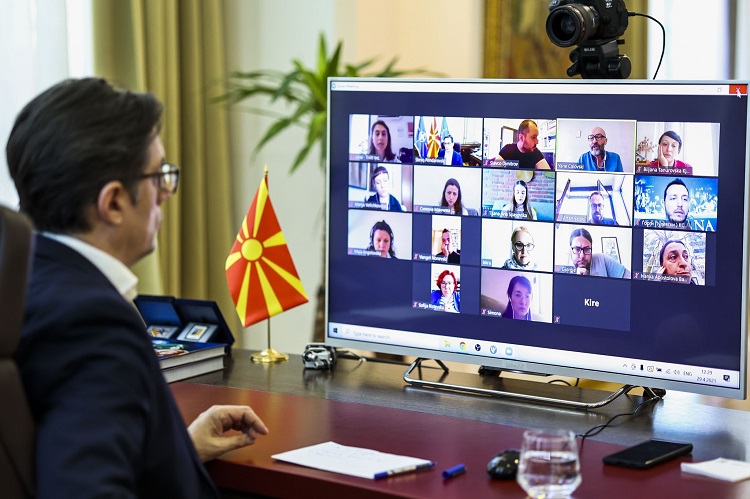
Representatives of several organizations of "Jadro" had an online meeting with President Pendarovski. What were the conclusions from that meeting?
- We also held a meeting with President Pendarovski to better acquaint him with the developments on the stage and the challenges facing the independent cultural sector. That meeting was also important, we had the opportunity to acquaint him with the situation on the stage and to hear our views and attitudes. It is obvious that he is following the work of "Jadro", so that the current advocacy activities were not unknown to him, on the contrary. He supports our commitment to progressive cultural policies and the sustainable development of the independent cultural sector and stressed that he remains open to dialogue and that he will monitor and support the further advocacy activities of the association.
How, according to the members of "Jadro", can the condition of the cultural scene in our country be improved?
- The situation can be improved by opening a dialogue and a sincere desire for changes in the way things work in institutions such as the Ministry of Culture, which are based on the development of cultural policies and sustainable development, both national institutions and independent cultural sector, which is the most dynamic and most progressive in terms of program content and quality in the offer, as well as in terms of accountability. We all operate in Macedonia, which is an incredibly rich multicultural and multiethnic country, with extremely valuable and talented individuals and organizations, who for years have built a community and a language of solidarity, and to whom even the imposed politicization carried out for years can not break of the joint critical reflection of culture. The members of "Jadro", but also all others active in the independent cultural sector, are tired of empty promises. My personal commitment to Jadro is to persevere in the processes of direct dialogue, public information and sharing of all open dialogues and requests for systemic change that will improve the work of cultural workers and independent organizations and all others who feel affected and neglected. in the current political moment.
The result of some of the activities of "Jadro" are the establishment of the Cultural and Social Spaces "Centar-Jadro" in Skopje and "Podium-Jadro" in Kavadarci. Does this mean that the local government is more flexible in the realization of some of your plans?
- Today, as before, the key activity of the association is to continue to strive to create conditions for sustainable development of the art scene. One such significant step is the formation of inclusive spaces, public-civic partnerships where a democratic and progressive culture will be nurtured, through the affirmation of authors and the development of artistic and socio-cultural practices in relation to the local community. The local government has always had more sense of this institutional model, which is to be expected. It is crucial that the citizens of the community are directly involved in all decisions, and that enables the founding dialogue to flow transparently and to go through all legal steps with a public debate. This process, according to its nature and methodology, is also educational for the local community, because here for the first time in this neoliberal system we demand that culture be respected as a value realized through the principle of civil-public partnership, which is not profit-oriented. Of course, when something is done for the first time, the process takes longer, but that's okay, because the longer path is worth walking when we stand for the common good. What is very important is that the local self-government becomes aware that the only sustainable are the institutions that we can build together on a legal basis, but also on a sustainable and accountable financial approach to the community. The time spent by citizens for unsustainable project models of individual organizations is over, no matter how attractive they were in the short term due to their location or name. It is time to return to the principled and sustainable work and the continuous building of mutual dialogue, because creating cultural and social values for the community is in the interest of all of us.
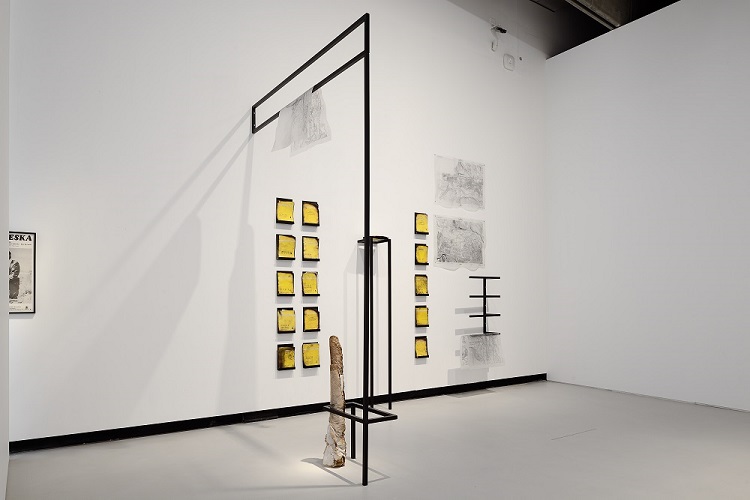
Your primary activity is in the field of visual arts. Together with Hristina Ivanoska you are part of a group exhibition at the MAXXI National Museum in Rome. Lately you live on the route Skopje - Berlin. Which projects preoccupy you the most during this period?
- It is a real honor for me that part of my extensive and long-term research project "Undisciplined Construction of an Archive" is presented at the exhibition "Bigger Than Me: Heroic Voices from the Former Yugoslavia" at the National Museum of Arts on the 21st. century - MAXXI in Rome. The exhibition is curated by the legendary Slovenian curator of contemporary art Zdenka Badovinac and it was a pleasure to realize a new sculptural-architectural installation which integrates part of the archival material from the now non-existent Institute of Urbanism and Architecture, which refers to Skopje. Hristina Ivanoska (Jane's wife, n.z.) presented herself with an installation consisting of printed material and a selection of videos entitled "The Missing Document", which refers to the non-existent, marginalized and forgotten history of women in Macedonia.
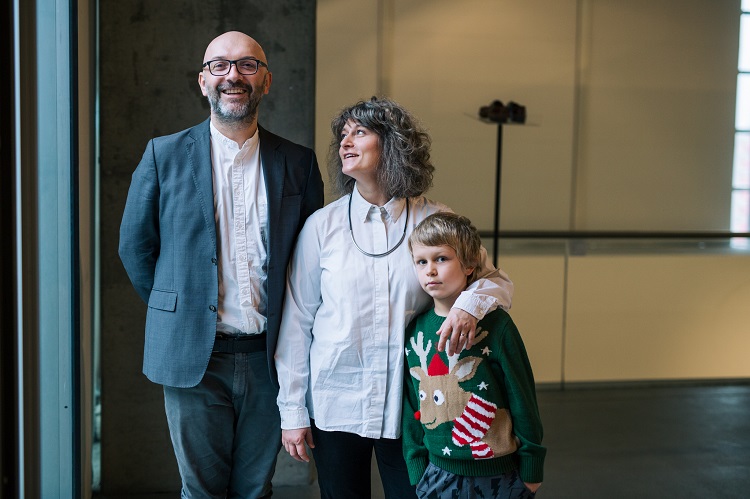
Recently, the publication "Makedonium: Dramaturgy of the Unfinished" was published, a collaborative author project with Hristina Ivanoska for which we are preparing an appropriate promotion in Skopje and Hanover. It is interesting that last fall we had the opportunity with Hristina and our son Theodor to start a study stay in Berlin, so the last nine months are really intense and inspiring work and private.
(The interview was published in "Cultural Press" No. 84, in the print edition of "Free Press" on June 12-13, 2021)


